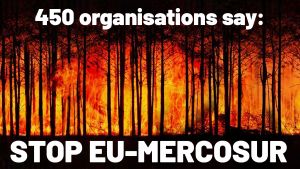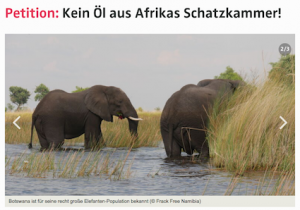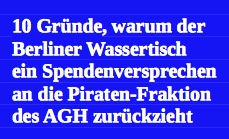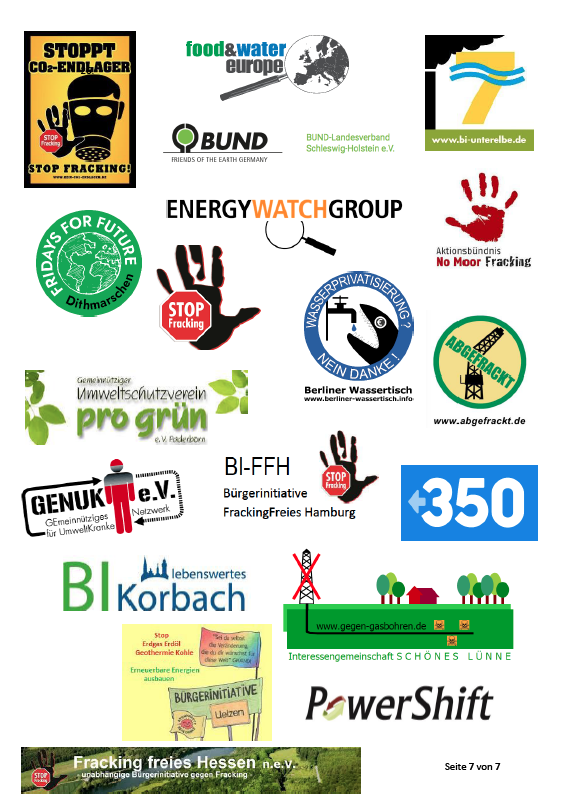Privatsphäre stärkt, Überwachung schwächt! #StopScanningMe


Suche

Schiefergas-Fracking in Deutschland?

#StopEUMercosur Erklärung

Aktion Greenpeace: #StopEUMercosur

#SaveTheOkavangoDelta

Erfolgreich! Über 1 Million Unterschriften „Green Deal“ – Europäische Bürgerinitiative (EBI)

Stop Energiecharta. #NoECT. Wir wollen raus aus dem Anti-Klimaschutz-Vertrag

Europäische Bürgerinitiative gegen biometrische Massenüberwachung (17.2.2021-17.2.2022)

Lebensgefährliche Entwicklung: Gewinnorientierung im Krankenhaus

- Wassertisch-Plenum,
im NewYorck / Bethanien Mariannenplatz 2A
10997 Berlin Openstreetmap fällt coronabedingt aus Überblick (Messstellen: Oberflächengewässer und Grundwasser)


-
Letzte Beiträge
- AöW zum Weltwassertag 2023: Interkommunale Zusammenarbeit noch stärker ermöglichen
- Greenpeace: Fracking – eine unterirdisch schlechte Idee
- Bürgerinitiative gegen CO2-Endlager: Offener Brief an den Bundesminister für Wirtschaft und Klimaschutz Dr. Robert Habeck
- BUND gegen CCS-Endlager
- Jürgen Knirsch: CETA-Handelsabkommen: Eine trügerische Wette auf die Zukunft (Leserbrief an die SZ vom 8.12.2022)
- Neuere Materialien und Dokumente zur CETA-Debatte
- TAZ: Hamburger Abgeordneter über Olympia-Gedankenspiele: „Es kommt zu Vertreibungen“
- NDR: Bewirbt sich Hamburg noch einmal um Olympische Spiele?
- NGO-Bündnis fordert mit gemeinsamen Appell die Senkung des absoluten Ressourcenverbrauchs
- Allianz der öffentlichen Wasserwirtschaft warnt vor CETA: Mit dem jetzigen CETA-Text wird der Schutz der öffentlichen Wasserwirtschaft vor einer Kommerzialisierung weiter geschwächt

Delius-Klage

Keine Steuergelder für LNG-Fracking-Gas Terminals in Deutschland!

RSS-Feeds
Schlagwort-Archive: s2b
JEFTA – Offener Brief an die EU-Parlamentarier_innen
 Seattle to Brussels Network
Seattle to Brussels Network
European letter on the EU-Japan FTA (JEFTA) to members of national parliaments
May 22, 2018
To Honorable Members of Parliament,
We, the undersigned civil society organisations, hereby express our deep concern about the planned fast-tracking of the ratification of the EU-Japan Economic Partnership Agreement.
JEFTA is the biggest trade agreement ever concluded by the European Union, with a country which GDP is three times higher than the one of Canada. It would cover a quarter of the world’s GDP.
Like the controversial CETA – the EU Canada trade agreement – JEFTA, once ratified, would be politically almost impossible to terminate and extremely hard to amend. There will be no fixing problems after ratification.
JEFTA contains rules severely limiting policy space in the EU and in its member states. As the agreement covers all levels of decision-making, it would become a straightjacket for the EU, for member states, and even for regional and local governments.
Ensuring proper scrutiny of JEFTA’s content before its signature is therefore of prime importance. Yet, after negotiating the agreement in almost total secrecy for over 5 years, the EU and member states might soon decide to fast-track its ratification.
JEFTA has been presented to the Council of the EU in April 2018 as an “EU only” agreement. National parliaments will be denied a vote on a treaty which will constrain their powers. Such minimal scrutiny is a new blow to the proper democratic debate on the type of trade policy European citizens need.
We therefore call on representatives of the national electorate to ensure sufficient time for a careful review of the trade agreement. A fast-track procedure with a vote possibly already on June 26, 2018, would make a careful review impossible.
We wish to highlight some of our fundamental concerns about the agreement in its current form:
- The EU-Japan Economic Partnership Agreement uses a negative list approach for services. This method severely limits governments’ ability to create, expand, and regulate public services and reverse failed liberalisations or privatisations, and makes it extremely hard to protect high-quality services such as water, transport, education, social and health care, as well as attempts to provide public services in line with public interest goals.
- The financial services chapter of the agreement (Articles 8.58 to 8.67) reduces the instruments available to combat financial speculation and inflation, obstructs banking structure reform and would thus, once implemented, constitute a threat to financial stability and an obstacle to initiatives to stabilise the current financial system.
- JEFTA would further constrain the ability of the EU and member states to control Japanese food and feed imports (Artile 6.7, especially 6.7.4), even though there are already documented cases of imports of illegal GMO feed from Japan. Worldwide, Japan is the country with most GM crops approved both for food and feed
- JEFTA creates ten dialogues (Article 22.3) between regulators of the EU and Japan on matters which touch upon national competences: Government Procurement, Agriculture, Food Safety, Services, Investment, Electronic Commerce, etc. There is no guarantee in the text that national parliaments will be involved. It is even possible for this cooperation to open in new areas, without national parliament’s approval.
- There is no reference to the precautionary principle in the Chapter on SPS measures or in the TBT chapter.
- JEFTA’s chapter 8 on trade in services, investment liberalisation and electronic commerce contains implicit and explicit cross-border data flow commitments (Sections C and E respectively) which would constrain the ability of governments to regulate data flows, and may undermine the protection of the fundamental right to the protection of personal data. The complete exclusion of this fundamental right from the agreement is also not ensured.
- The trade agreement’s intellectual property rights chapter would limit possibilities for future copyright and patent reform.
- The deal will make it almost impossible for European regulators and courts to require Japanese banks or car-makers to submit their software and IT equipments for government audits to check conformity with domestic laws on deceptive practices and environmental requirements.
- The trade and sustainable development chapter of JEFTA (Chapter 16) is even weaker than the one in CETA. Moreover Japan has not ratified two of the eight core ILO conventions and the provisions on trade in illegal timber are weak and could eventually weaken the EU’s own attempts to tackle the issue.
- Behind closed doors, the EU and Japan are still negotiating parallel tribunals for foreign investors. Those tribunals have already been used by Japanese investors against the Spanish state. Those cases are ongoing, costing millions to Spanish tax payers. This broken system must not be expanded in JEFTA.
JEFTA contains many more provisions likely to harm people and the environment. The biggest trade agreement of the EU requires much more scrutiny than it is currently receiving.
We need a paradigm shift toward a transparent and inclusive trade policy founded on the needs of people and our planet. JEFTA is not a progressive trade deal. On the contrary: ratifying JEFTA, especially without proper scrutiny, will lead us further away from a much needed change.
Signatories :
Greenpeace, International
European Environmental Bureau, Europe
European Water Movement, Europe
European Trade Union Committee for Education (ETUCE), Europe
European Public Services Union (EPSU), Europe
Friends of the Earth Europe, Europe
TROCA- Plataforma por um Comércio Internacional Justo (national platform), Portugal
Anders Handeln (national platform), Austria
Netzwerk Gerechter Welthandel (national platform), Germany
Stop CETA Alliance Ireland (national platform), Ireland
Attac Austria, Austria
ÖBV-Via Campesina Austria, Austria
11.11.11, Belgium
Food & Water Europe, Belgium
Centrale Nationale des Employés (CNE), Belgium
Corporate Europe Observatory, Belgium
“Europe and we”, Bulgaria
Afrika Kontakt, Denmark
NOAH Friends of the Earth Denmark, Denmark
Occupy Denmark, Denmark
Association CRI-AC !, France
ATTAC France, France
Confederation paysanne, France
foodwatch France, France
Les Amis de la Terre, France
Berliner Wassertisch, Germany
FDCL, Germany
foodwatch Germany, Germany
Kölner Bündnis für gerechten Welthandel, Germany
IATP Europe, Germany
NaturFreunde Deutschlands e.V., Germany
Slow Food Deutschland e. V., Germany
PowerShift e.V., Germany
An Claíomh Glas, Ireland
CONNECT Trade Union, Ireland
Comhlámh, Ireland
FÍS NUA, Ireland
Irish Cattle and Sheep Farmers Association Ireland, Ireland
Keep Ireland Fracking Free, Ireland
Environmental Pillar, Ireland
Fairwatch, Italy
Mouvement Ecologique, Luxembourg
Both ENDS, Netherlands
foodwatch Netherlands, Netherlands
Platform ABC, Netherlands
Transnational Institute, Netherlands
CIDAC, Portugal
Corporations-ZeroTtolerance, Portugal
GAIA-Grupo de Accao e Intervencao Ambiental, Portugal
GEOTA, Portugal
Palombar – Associação de Conservação da Natureza e do Património Rural, Portugal
Plataforma Alagrve livre de Petróleo, Portugal
Sindicato dos Professores da Grande Lisboa, Portugal
SOS Racismo, Portugal
ASMAA ALGARVE SURF & MARINE ACTIVITIES ASSOCIATION, Portugal
ZERO – Association for the Sustainability of the Earth System, Portugal
Umanotera, Slovenia
ATTAC Spain, Spain
Coordinadora Ecologista de Asturias, Spain
Equo, Spain
Confederación Intersindical, Spain
Ecologistas en Acción, Spain
Plataforma Auditoría Ciudadana Deuda Sevilla , Spain
Podem Sanitat Catalunya , Spain
STE SEGOVIA, Spain
Intersindical Valenciana, Spain
2 http://www.isaaa.org/resources/publications/briefs/52/executivesummary/default.asp

 Pressemitteilungen
Pressemitteilungen








